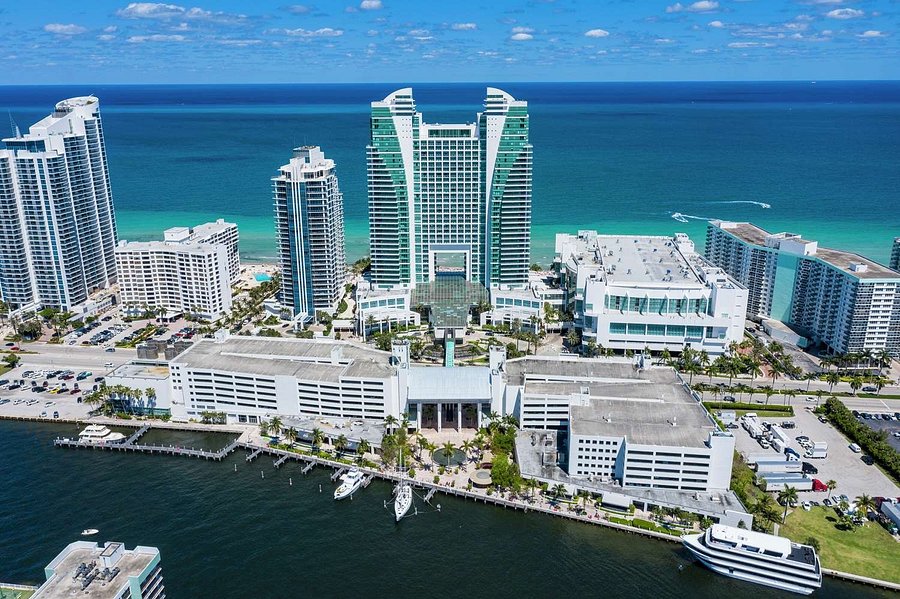HOLLYWOOD, Fla. — In February, two investment firms purchased the Diplomat Beach Resort for a historic $835 million.
Situated between two international airports, the 39-story hotel overlooks 10 acres of Atlantic Ocean beachfront and comes fully equipped with modern amenities designed for year-round use.
However, as shoreline erosion persists, the National Oceanic and Atmospheric Administration (NOAA) predicts that Hollywood will experience flooding above six feet by the end of this century.
Before closing the third largest single-asset hotel deal in U.S. history, the buyers needed to understand what environmental stressors would impact the property and what actions they could take to prevent downtime, ultimately protecting the viability of their investment.
Alongside sustainability consulting firm partner, Shift Sustainable, Atlas deployed a Climate Risk and Resilience Assessment to review the resort’s risk levels for experiencing various climate hazards through 2050.
In under three weeks, Atlas’ task force:
- Outlined specific climate risks that could impact the property for the next 27 years.
- Detailed proactive measures with calculated costs to increase resiliency to recognized climate threats.
- Illustrated the cost of proactive versus reactive measures by event for better capital improvement planning.
But for investors looking to establish return-oriented assets in Florida, one of the top tourist destinations in the world, resiliency to natural disasters is critical.
Protecting assets against climate threats
Heat Stress
Hot days are expected to increase over the next 27 years as the global climate continues to warm.
The U.S. Global Change Research Program predicts that Broward County will see an increase in days over 95° F from a recorded five days in 2022 to 60 days per year in 2050.
In a higher greenhouse gas emissions scenario, the most vulnerable elements of the Diplomat Beach Resort are the mechanical systems.
First Street Foundation, a research and technology group helping define America’s climate risk, estimates that the expected temperature increases in Hollywood will result in a 7.7 percent energy use increase over the next 30 years.
Because the central plant was sized to accommodate an adjacent condominium but was never directly connected to that site, Atlas expects the central plant to have ample capacity to handle an increased cooling load.
Cooling won’t exceed the available capacity. However, an increased use of the cooling systems will mean additional wear and tear on HVAC equipment, resulting in more frequent cooling-related equipment maintenance and a potential reduction in expected useful life of HVAC equipment.

“The climate risk and resilience assessment helped our client understand what hazards await the resort in the future and how best to minimize the impacts from climate change enhanced events. Providing reactive vs. proactive costs really illustrated the importance of preparation for future weather events.” — Tammy Rykal, Utility and Energy Engineer at Atlas
Hurricanes and Sea Level Rise
The Federal Emergency Management Agency’s (FEMA) national risk index considers Broward County to have a relatively high risk of hurricanes when compared to the rest of the U.S.
FEMA Flood Map Service Center categorizes this property as an area within the 100-year floodplain, an area with a one percent annual chance of being inundated by a flood event.
Flooding is possible due to hurricanes and heavy storms, as well as sea level rise. By 2050, sea levels are expected to potentially rise by approximately three feet. In the event of a hurricane, climate projections indicate the property could see a storm surge of nearly six feet.
Anything near or below this elevation would be at risk of significant damage.
Fortunately, the Diplomat Beach Resort was built to withstand flood risk. On the beach side of the property, an almost 10-foot-tall bulkhead provides a barricade against water incursion. In fact, most levels of the campus sit above six feet of elevation; even the lower pool deck sits at almost 11 feet.
Tornadoes and High Wind
To assess tornado risk, Atlas reviewed historical tornado records for Broward County and FEMA’s National Risk Index.
According to the NOAA Storm Events Database, Broward County has experienced 40 tornadoes since 2000.
Only one was categorized as an EF2 storm, which is considered strong, but not “severe (EF3),” “devastating (EF4),” or “incredible (EF5).”
FEMA classifies Broward County as having a “relatively high” risk of tornadoes. The frequent occurrence of severe thunderstorms, tropical storms, and hurricanes is a likely contributor.
Long-term tornado projections are sparse due to the sporadic nature of these storms, but it’s possible that an increase in hurricane and thunderstorm intensity with a warming climate could result in more conditions that support the formation of tornadoes.
During high wind events, the building frame and envelope are the most vulnerable building elements. And windows, doors, and roof structures are at risk of detaching or sustaining damage from airborne objects.
The site walkthrough and evaluation revealed that the Diplomat Beach Resort was designed to meet or exceed the ASCE-7 standard, the design standard that governs wind loads and pressures that a structure should be able to withstand.
Making data-driven investment decisions
Real estate investors deploy climate risk and resilience assessments to uncover property histories, susceptible building components, and asset performance projections.
At Atlas, we take it a step further by providing our partners with a comparison of preventive and reactive costs per climate hazard, so buyers can get a full picture of their financial exposure before closing.
Our knowledgeable team of assessors crunch energy expenditure data and savings methods to create a custom chart of one-time preventive costs (e.g., implementing resilient tech), storm-by-storm reactive costs after significant damages (like full replacements), and loss revenues due to operational downtime.
The owners can use this data to pinpoint capital improvements that could boost the Diplomat Beach Resort’s lifecycle, keep occupancy rates healthy, and establish the hotel as a modern, luxury paradise.
To learn about our full suite of due diligence services, contact us today.
